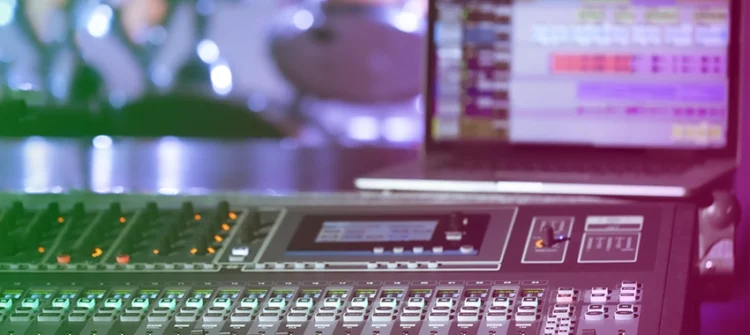
Producing your own music involves a whole of different techniques and methods, but mixing and mastering are fundamental to understanding the creation of your masterpiece.
When it comes to the art of being a professional DJ, the creation of songs is probably one of the most challenging processes.
Each song goes through three phases: recording, mixing and mastering – always in that order. We can all imagine what recording is like, but the line between mixing and mastering is very thin.
Mixing and mastering have often been used instinctively in the past, but in recent years it has become obvious how different they really are. Although they have similar attributes, they have different functions, and both are important in their own right.
Subscribe to our newsletter 🎧
What is the difference between mixing and mastering?
Below, we will describe each process in its simplest form.
Mixing is the stage after recording where you blend individual tracks together, while mastering is the the final stage of audio production where you polish the entire mix to prepare for distribution.
In other words, mixing is when an engineer carves and balances the separate tracks in a session to sound good when played together. While mastering a song means putting the finishing touches on a track by enhancing the overall sound, creating consistency across the album, and preparing it for distribution.
6 Important Differences Between Mixing and Mastering
- Mixing creates a balance between individual elements. It transforms them into a cohesive whole. Mastering takes that whole and gives it a final polish. Consequently, you can create a mix without mastering it, but you can’t master a recording without mixing it first.
- Mixing gives you access to every instrument in a song. Need more lead vocal? No problem. While mastering, you only have access to the final mix. This makes altering the balance between individual elements much more difficult.
- At both the mixing and mastering stages, you’re striving to achieve balance. The difference is that during mixing you’re balancing individual instruments. During mastering, you’re balancing complete songs and spectral content. Simply put, mixing makes instruments sound good together; mastering makes songs sound good together.
- Mixing sessions can be huge. A simple rock or pop arrangement can easily contain 32+ tracks, while complex projects can have track counts in the hundreds. Mastering sessions, on the other hand, typically consist of one stereo or multitrack file per song, or possibly multiple stems.
- While mixing, you make lots of adjustments — some quite heavy-handed — to each track. After all, your tweaks only affect that particular element. Mastering is the complete opposite — it uses subtle broad strokes that affect the entire song.
What is mixing?
Mixing is the beginning of the post-production process. Once you have written, recorded and produced your music, it’s time for mixing.
A mix engineer is in charge of balancing the various tracks in your session so they sound nice and cohesive when played together. They reduce the clash between instruments, vocals and different elements of the song.
A mix will also have several different tracks, between the different instrumental layers, digital instruments, a microphone, a keyboard, etc. – a session can easily contain more than 30 tracks.
In general, most mix engineers start their process by organizing and labeling each component, for example, placing all the drum tracks in the same color and area of their workspace.
During mixing, many adjustments are made to each section in order to fine tune and create the desired sound.
Mixing is about creating a balance between all aspects of the song, whether it is volume, frequency, placement or dynamics. This process is about enhancing the artist’s vision and making sure the original intent of the song shines through. Sometimes there are several mixes before both the artist and producer are ready for the song to go to mastering.
What is mastering?
When the mix is finished, it is ready to go to mastering. Mastering is the last stage of the production process, the final step your music receives before it heads to distribution.
Mastering engineers also aim to achieve an overall balance, but unlike mixing, they do so across a broader spectrum throughout the song and the entire album.
The goal of mastering is to polish the mix to the best possible sound and make your song(s) sound like other professional songs heard on streaming platforms, on the radio, or in movies…
- The goal is to make the track louder.
- Sound better.
- More compatible with different types of speakers, usually by adjusting aspects such as equalization, compression, limiting and stereo enhancement.
Is mastering harder than mixing?
A mastering engineer is the last person in the creative process who is responsible for catching mistakes, changing the sound and putting the finishing touches on it.
If there’s a sound that shouldn’t be there (whether it’s outside traffic, a conversation, etc.), the mastering engineer has to be very attentive and focused to catch those small but vital mistakes.
It’s helpful to have someone else master your project, as it’s easier for them to catch mistakes or hear unwanted sounds because they haven’t been mixing the song for hours.
As you can see, order is extremely important when it comes to production. Forget about mastering until you have a good mix!

